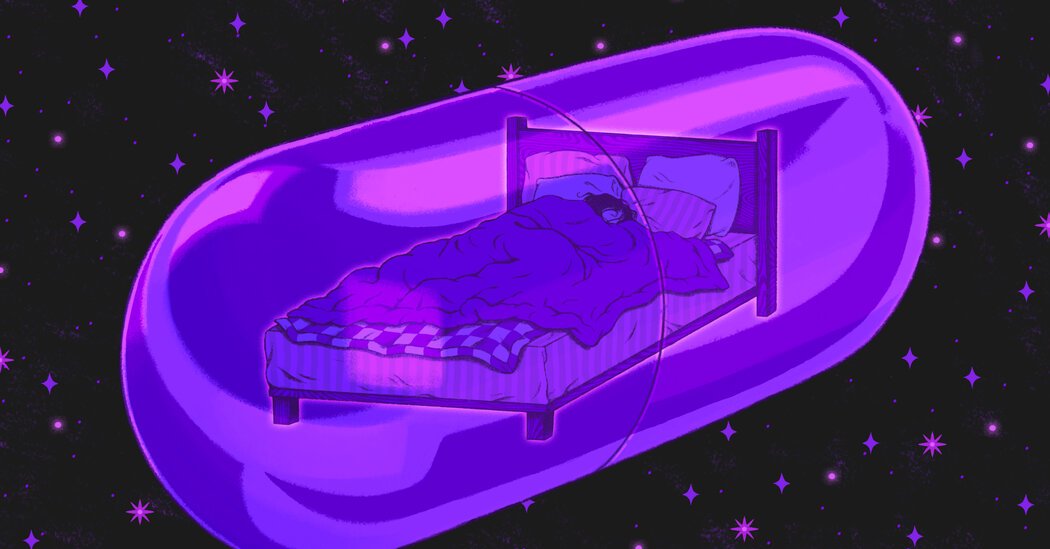[ad_1]
About a third of adults around the globe say they sometimes struggle to fall asleep or stay asleep. If you’re one of them, you may have tried sleep medications to find temporary tranquillity.
There is a growing category of prescription pills, including suvorexant (Belsomra) and ramelteon (Rozerem), approved specifically for sleep. Doctors can also prescribe drugs like the antidepressant mirtazepine (Remeron) off label for insomnia. And over-the-counter antihistamines like diphenhydramine (Benadryl) or doxylamine (Unisom) can also double as sedatives.
“We’re really in a golden age” of insomnia drugs, said Dr. David Neubauer, a sleep specialist at Johns Hopkins Medicine. Doctors can suggest different treatments depending on the type of sleep trouble you have — whether your mind is racing or you wake up multiple times in the middle of the night.
But all sleep drugs carry risks, such as daytime grogginess, and some are even habit-forming. That’s why experts say it’s best to limit how much you rely on them.
“The ideal use of these medications is only as needed, so I would say about two or three times a week, limited to a short period of time,” said Dr. Alcibiades Rodriguez, a sleep medicine expert at NYU Langone Health.
When should you use sleeping pills?
There are situations where using sleeping pills judiciously could be helpful, like during a two- or three-week bout of insomnia triggered by a specific event. A doctor may also recommend sleeping pills as a last resort if you’ve failed to get restful sleep after trying lifestyle changes, such as avoiding screens at night, and cognitive behavioral therapy tactics designed specifically for sleep.
You should always consult with a health provider before you start taking sleep medication so you can make a plan for how long you’re going to take the pills. If you still need them after one month, talk to a doctor to determine if another treatment or medication would work better or to see if you have a condition that is contributing to your poor sleep and can’t be addressed with any sleeping pills.
What works for you will depend on the cause of your insomnia, Dr. Neubauer said. Rozerem works by stimulating the brain’s melatonin receptor to help you maintain a normal sleep cycle. Doctors sometimes prescribe drugs called benzodiazepines, which can both reduce anxiety and make you drowsy, if you have trouble falling asleep. These include alprazolam (Xanax) and clonazepam (Klonopin). There are also non-benzodiazepine drugs, such as zolpidem (Ambien) and eszopiclone (Lunesta), that can produce similar effects.
How bad is it to take sleeping pills every night?
Over-the-counter antihistamines haven’t been well studied for their effects on sleep, and the American Academy of Sleep Medicine recommends against using them for insomnia. Many can linger in your system and cause daytime grogginess and falls. Long-term use can carry the risk of memory problems, confusion and constipation, all of which may be more pronounced in older adults. Some studies have suggested long-term antihistamine use is associated with increased dementia risk, though the link is not definitive.
While they aren’t considered sleeping pills, many people also take supplements like the hormone melatonin for insomnia. Experts said it’s important to note that many supplements have not been rigorously tested for effectiveness and may not contain the amount of melatonin listed on their labels — or any at all.
Prescription pills have their own side effects, from dizziness and headaches to gastrointestinal problems. You also shouldn’t mix them with certain drugs and substances, including alcohol, opiates and antidepressants. Doing so can further depress the central nervous system and result in slowed breathing, which can be dangerous, Dr. Neubauer said. And prescription sleeping pills can trigger sleepwalking or lead to severely impaired driving.
The body can become accustomed to these pills over time, so people often end up needing higher doses to get the same effect, Dr. Rodriguez said. With some of these drugs, especially benzodiazepines, this dependency can escalate into addiction. That’s why it can be so difficult for people to come off sleep medication and why many stay on prescription pills for years.
How do you wean yourself off?
You need a slow and strategic approach, said Dr. Jade Wu, a sleep psychologist at Duke University who also consults with the sleep wellness company Hatch. In some people, stopping sleep medication abruptly after more than a month of use can trigger withdrawal symptoms, which can include heightened anxiety, restlessness or rebound insomnia, meaning your sleep is disrupted again. Most experts recommend tapering your dose down over several weeks or months with the help of a doctor.
Cognitive behavioral therapy for insomnia can also address the causes of insomnia, focusing on modifying behaviors and thought patterns that contribute to sleep problems. Studies have shown that CBT-I may provide a more durable alternative to medication.
It is also essential to set up good bedtime habits, such as sleeping in a dark room and avoiding screens, which can help with rebound insomnia.
“There might be some rocky nights here and there, but that’s OK,” Dr. Wu said. “Have faith that you’re not actually backsliding.”
[ad_2]
